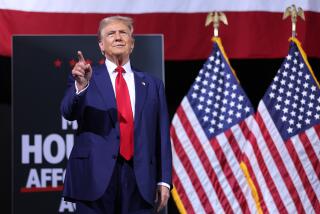Contrarian candidate
- Share via
John McCain’s “Time for Action” tour of small and hard-hit towns played a bit like an extended campaign commercial, but with an important difference. Yes, there were the photo ops of the candidate in locales usually bypassed by Republicans seeking the White House, including an African American quilting hotbed in rural Alabama, a shuttered factory in a struggling Ohio town and an impoverished Appalachian community in eastern Kentucky. But instead of promising truckloads of aid if he’s elected, McCain talked up his vision of a government that helps more by doing less.
It’s not a new message from the Arizona senator, who follows an unpredictable political muse but typically favors smaller government and less regulation. Yet the context was important. Standing outside the Ohio factory Tuesday, in a state where Democrats Barack Obama and Hillary Rodham Clinton pandered to protectionists, McCain actually stood up for the North American Free Trade Agreement and free trade. The lost factory jobs aren’t coming back, McCain said, and rather than waging a futile fight against globalization, Washington should do a better job training workers for careers in the new economy.
The next day he visited Inez, Ky., where nearly a third of the population lives below the poverty line and almost half of the adults never made it through high school. President Lyndon Johnson announced his War on Poverty in Inez, but McCain was there to withdraw the troops. “Government can’t create good and lasting jobs outside of government,” he said, adding that it should focus on encouraging businesses to create opportunities for the poor and reduce regulatory barriers to improving education.
In fairness, McCain tailored some of his pitches to please the crowds. For example, his message drifted into government-will-take-care-of-you territory when his tour reached New Orleans, where he condemned the Bush administration’s response to Hurricane Katrina. (Democrats responded by noting that McCain had voted against $28 billion in emergency aid to the region.) And his deregulatory stance rang hollow at times, such as when he argued in Kentucky that improving education and training for women was a better response to employment discrimination than making it more feasible for victims to sue -- as if an employer’s bias could be overcome by making female workers even more qualified. But by making a point of saying things his audiences might not want to hear, he gave voters a better feel for who he is and how he thinks. As Obama and Clinton focused on exposing each other’s weaknesses, it was nice to see one candidate reveal more about himself.
More to Read
Get the L.A. Times Politics newsletter
Deeply reported insights into legislation, politics and policy from Sacramento, Washington and beyond. In your inbox twice per week.
You may occasionally receive promotional content from the Los Angeles Times.







